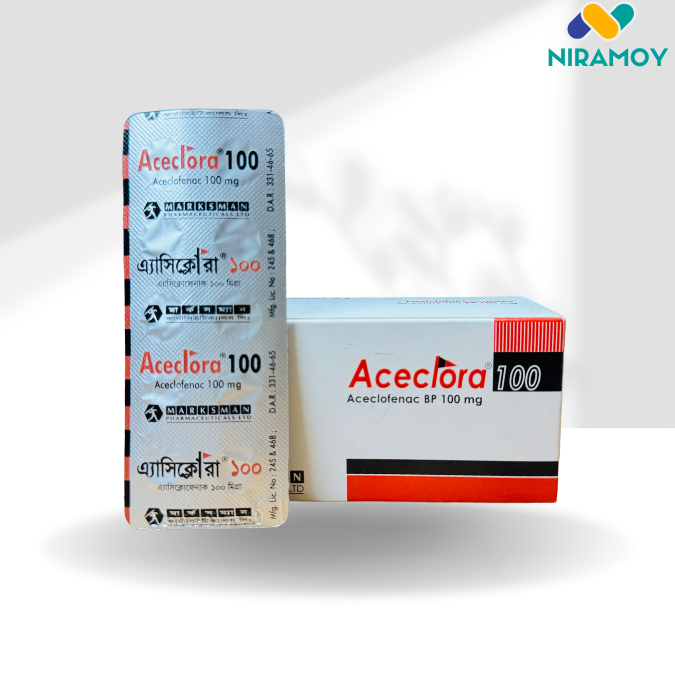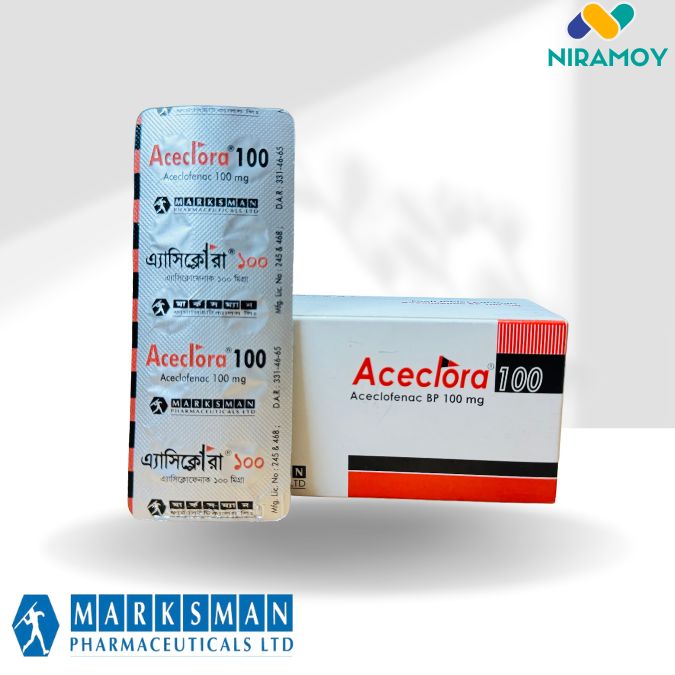



Aceclofenac 100 mg Tablet is a nonsteroidal anti-inflammatory drug (NSAID) used to alleviate pain and inflammation associated with conditions such as osteoarthritis, rheumatoid arthritis, and ankylosing spondylitis. By inhibiting the production of prostaglandins—chemicals in the body responsible for inflammation and pain—Aceclofenac effectively reduces swelling, stiffness, and discomfort. It is typically administered as one tablet twice daily, preferably with food, to minimize gastrointestinal irritation. Read more
Aceclora 100 mg Tablet (Aceclofenac)
Aceclora 100 mg contains aceclofenac, a nonsteroidal anti-inflammatory drug (NSAID) widely used to relieve pain and inflammation. It is primarily prescribed for the management of musculoskeletal conditions such as osteoarthritis, rheumatoid arthritis, and ankylosing spondylitis, as well as for acute pain syndromes like soft tissue injuries.
Aceclofenac works by inhibiting the enzyme cyclooxygenase (COX), particularly COX-2, which is involved in the production of prostaglandins—chemical mediators that cause inflammation, pain, and swelling. By reducing prostaglandin synthesis, Aceclora effectively decreases inflammation and provides analgesic (pain-relieving) effects.
Osteoarthritis: Relieves joint pain, stiffness, and inflammation
Rheumatoid arthritis: Helps control inflammation and joint damage
Ankylosing spondylitis: Reduces spinal inflammation and improves mobility
Soft tissue injuries: Manages pain and swelling from sprains, strains, or trauma
Postoperative pain: Sometimes prescribed to reduce inflammation after surgery
The usual dose of Aceclora 100 mg is one tablet twice daily, taken orally with meals to reduce the risk of gastrointestinal irritation. The exact dose and duration depend on the severity of the condition and the patient’s response. It should be taken under medical supervision, especially for long-term use.
Common side effects include:
Gastrointestinal discomfort such as nausea, indigestion, and abdominal pain
Dizziness or headache
Skin rash or itching (rare)
Edema or fluid retention (in some cases)
Serious but rare adverse effects:
Gastrointestinal bleeding or ulcers
Liver or kidney dysfunction
Cardiovascular issues such as hypertension or increased risk of heart attack/stroke with prolonged use
Avoid use in patients with known hypersensitivity to aceclofenac or other NSAIDs
Use cautiously in individuals with history of gastrointestinal ulcers, bleeding, or cardiovascular diseases
Not recommended during the third trimester of pregnancy or breastfeeding without doctor’s advice
Monitor kidney and liver function during prolonged therapy
Avoid concurrent use with other NSAIDs or anticoagulants unless prescribed by a physician
Aceclora may interact with:
Blood thinners (e.g., warfarin) increasing bleeding risk
Other NSAIDs or corticosteroids increasing gastrointestinal side effects
Antihypertensive drugs reducing their effectiveness
Lithium or methotrexate requiring monitoring
Store in a cool, dry place below 30°C, away from direct sunlight and moisture. Keep out of reach of children.
Aceclora 100 mg is a potent NSAID effective in managing pain and inflammation in a range of musculoskeletal and inflammatory conditions. Proper medical guidance is essential to minimize side effects and ensure safe use.
| Specifications | Descriptions |
|---|---|
| Generic Name | Aceclofenac 100 mg |
| Brand Name | Aceclora 100 mg |
| Route of Administration | Oral |
| Therapeutic Class | Nonsteroidal Anti-Inflammatory Drug (NSAID) |

Lorem, ipsum dolor sit amet consectetur adipisicing elit. Exercitationem, facere nesciunt doloremque nobis debitis sint?